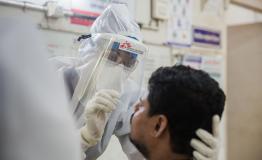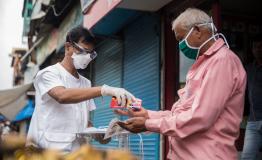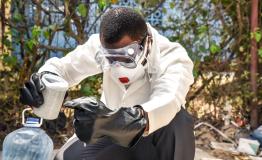In spite of constraints imposed by COVID-19, we continued to run a wide range of services in India, including mental health support for people affected by conflict in Kashmir, basic healthcare in remote areas of Chhattisgarh, and treatment for victims of sexual and gender-based violence in the capital, New Delhi.
In Manipur, our teams run HIV clinics offering a patient-centred approach to care, and support the antiretroviral treatment centre and HIV inpatient ward in a district hospital. We also distribute food coupons and dry rations to homeless intravenous drug users, and continue to work with the government to improve access to holistic care for HIV patients with life-threatening opportunistic infections.
During the second COVID-19 wave, we sent emergency teams to manage high-dependency units in Imphal and Churachandpur. We also launched a telemedicine and a mental health helpline for those diagnosed with the virus. In one of India’s poorest states, Bihar, we focus on providing both lifesaving and palliative care to patients living with advanced HIV. Nutrition and mental health support are important elements of our model of care.
In Mumbai, we treat complex cases of drug-resistant tuberculosis (TB) at our clinic and support outpatient services in M/East ward, which has one of the highest rates of the disease in the city. In 2021, we continued to treat patients enrolled in the endTB clinical trial, with the aim of generating more evidence for shorter, more tolerable, injection-free treatments for multidrug-resistant TB. During the COVID-19 pandemic, we offered phone consultations and provided longer drug refills to ensure continued care.
Our teams also supported the treatment of moderate COVID-19 patients in one of the city’s hospitals, provided training to Ministry of Health staff, and carried out health promotion and shielding activities in the community.












![$262 million subsidy should not go to pharma giants Pfizer and GSK for pneumococcal vaccine [Photo: MSF] $262 million subsidy should not go to pharma giants Pfizer and GSK for pneumococcal vaccine [Photo: MSF]](/sites/default/files/styles/card_half/public/msfimages/news/msf230311_medium.jpg?itok=54hg2m8i)
![Kingsley Makwale MSF clinician examining Aisha at Mbenje Health Centre [Photo: Isabel Corthier/MSF] Kingsley Makwale MSF clinician examining Aisha at Mbenje Health Centre [Photo: Isabel Corthier/MSF]](/sites/default/files/styles/card_half/public/msfimages/news/msf295979_medium.jpg?itok=44E7Kpp2)